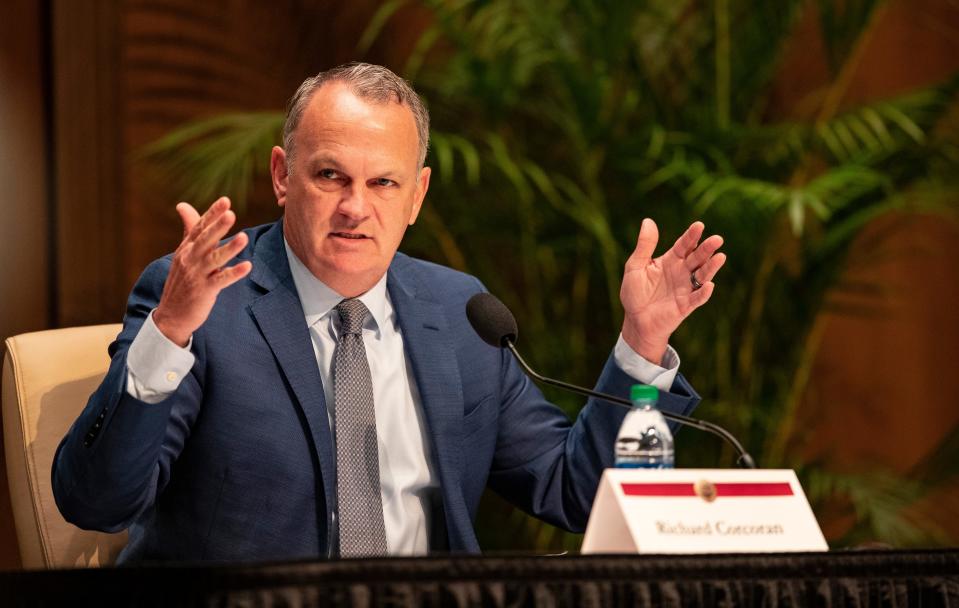UF presidential search must be transparent, free from political influence

- Oops!Something went wrong.Please try again later.
As the University of Florida prepares to search for its next president, state lawmakers are trying to make it easier to hide contenders for the position from the public.
Bills being considered in the current state legislative session, HB 703 and SB 520, would shield the names of candidates for a state university or college presidency from public release until the finalists are selected. The legislation would also close meetings held to vet candidates to the public.
But even under current law, a shadow selection process can happen outside of public view that flouts Florida’s Sunshine Law. During its last presidential search, UF held public meetings on such issues as compensation for the job but met privately with serious contenders in order to keep their names secret until late in the process.
More Sun editorials:
Progress made, but much work remains on racial equity efforts in Gainesville
Power plant decision raises questions about UF-Gainesville partnership
Florida officials should improve access to COVID testing, not discourage its use
The state legislation now being considered would require a list of presidential finalists to be released three weeks before a scheduled vote on a hiring decision, which would actually improve on the rushed process in which current UF President Kent Fuchs was hired. Fuchs formally applied for the job, was declared a finalist and was hired all over the course of just five days in 2014.
Sun reporting later revealed that UF booked out-of-town hotel rooms under false names and billed them to companies affiliated with a university trustee to hide meetings with Fuchs and other candidates from the public. A senior university official used a private email account when coordinating hotels and travel to avoid the public records requirements put on her UF account.
UF needs to conduct a more open process this time around to show that candidates are being selected based on their qualifications, not behind-the-scenes maneuvering by Gov. Ron DeSantis or other state political leaders. Fuchs announced Jan. 5 that he would be stepping down as president by early next year, following months of controversy over political influence on university decisions.
Last year, Florida State University showed how politics can affect a presidential search. State Education Commissioner Richard Corcoran was initially considered for the FSU presidency, despite his lack of higher education experience and a conflict of interest posed by him being part of the body with the final vote on hiring university presidents.

But FSU’s presidential search committee ultimately chose three finalists with strong academic credentials and past university leadership experience, before hiring former Harvard University vice provost Richard McCullough for the job. Of course, three of the previous four FSU presidents — John Thrasher, T.K. Wetherell and Sandy D'Alemberte — were state lawmakers before being hired to the position.
The sponsor of SB 520 — state Sen. Jeff Brandes, R-St. Petersburg — contends the legislation would allow for the “the broadest pool of applicants possible." Under current open government laws, Brandes told the Tallahassee Democrat, “People won’t apply to Florida schools because their records will be made public to their previous employer” and their jobs might be jeopardized as a result.
But as First Amendment Foundation Executive Director Pamela Marsh said, Florida’s institutions have risen in national rankings while led by presidents selected without such public records exemptions. Her group successfully fought past versions of the legislation introduced over the last several years
Whatever happens with the current bills, UF needs to hire its next president in an open and transparent process based on the candidate’s qualifications and not political connections.
Join the conversation
Send a letter to the editor (up to 200 words) to letters@gainesville.com. Letters must include the writer's full name and city of residence. Additional guidelines for submitting letters and longer guest columns can be found at bit.ly/sunopinionguidelines.
Journalism matters. Your support matters.
Get a digital subscription to the Gainesville Sun. Includes must-see content on Gainesville.com and Gatorsports.com, breaking news and updates on all your devices, and access to the Gainesville.com ePaper. Visit www.gainesville.com/subscribenow to sign up.
This article originally appeared on The Gainesville Sun: Editorial: UF presidential search must be open and transparent

